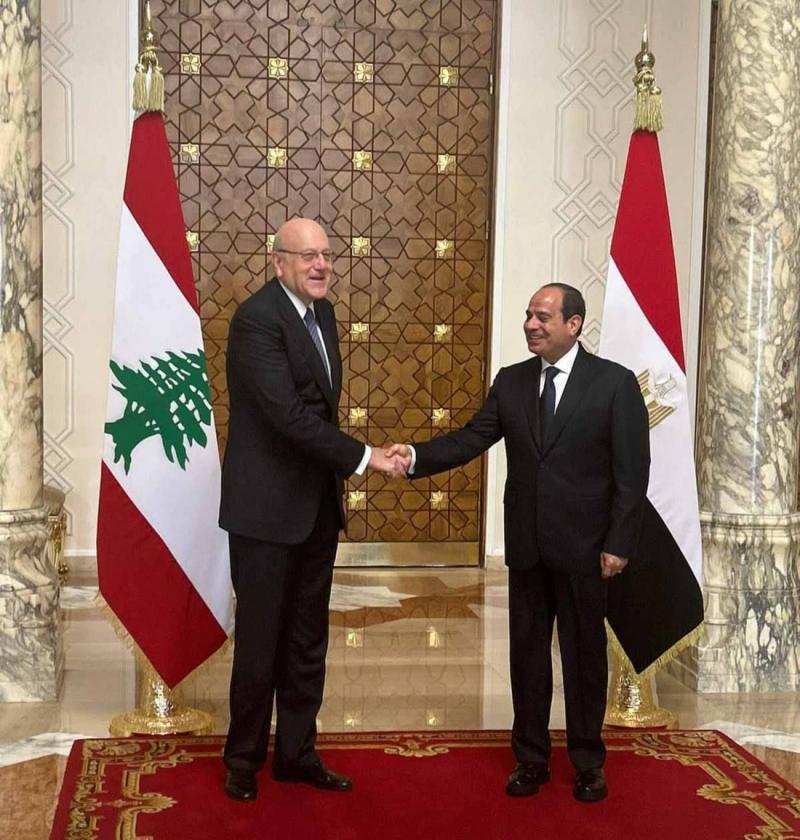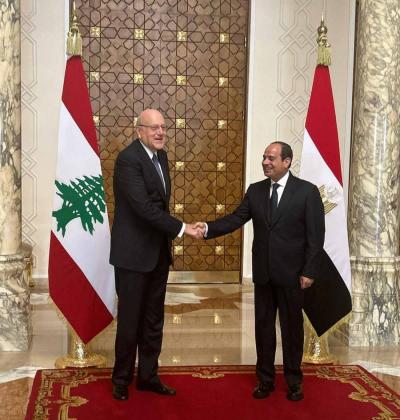Prime Minister Najib Mikati, currently leading a caretaker government, is criticized for his delayed external efforts to protect Lebanon following the outbreak of war in Gaza on October 7. He is also reproached for his government's silence regarding the ongoing clashes between Israel and Hezbollah in the border areas, as well as his lack of response to the complete sidelining of the state and its sovereignty in the recent comments made by Hezbollah's Secretary-General, Sayyed Hassan Nasrallah, who appeared to be the actual ruler of the country, making decisions regarding war and peace without indicating any coordination or understanding with the Lebanese state. Are these criticisms valid, and does Mikati and his government, in their current capacity as a caretaker government, possess sufficient executive authority to alter the situation controlled by both the party and Israel? Did Mikati delay the initiation of his Arab and international consultations for nearly three weeks after the war broke out?
Some circles within the government deny that the Prime Minister was slow to act, asserting that he began a series of communications with American and French officials mere hours after the clashes began, once he realized they were escalating beyond traditional confrontations. He subsequently requested appointments for an Arab tour that started in Qatar and continued to Egypt and Jordan, countries directly involved in the war, even if they, like Lebanon, lack a decisive voice should the situation deteriorate into a broader war. Mikati had the opportunity to meet with U.S. Secretary of State Antony Blinken in Amman to present Lebanon's perspective and listen to American assessments regarding the risks of the military operations and the possibilities of their expansion.
According to the newspaper "An-Nahar," what Mikati fears most is the increasing likelihood of the war expanding rather than receding. A month into the conflict, efforts to announce a ceasefire— even for humanitarian purposes— have failed, indicating an escalation rather than a de-escalation of tensions. Moreover, Israeli assaults along the southern border have exceeded the established rules of engagement, impacting international forces in the south and directly targeting civilians. This suggests continued escalation even after Hezbollah's stance, which seemed to change nothing in the landscape, and provided no guarantees against entering a war.
According to government sources, Mikati, through his actions, aimed to reaffirm the following Lebanese principles: commitment to international resolutions, particularly Resolution 1701, coordination with UNIFIL forces in the south, a clear rejection of war on Gaza, opposition to the displacement of its residents, and a demand for an end to Israeli aggression while ensuring sustainable delivery of aid. Regarding Lebanon's situation, Mikati called for maximum pressure on Israel to prevent the expansion of its assaults and warned against the dangers of slipping into a regional war.
Sources revealed that Mikati will present Lebanon's official stance at the emergency summit scheduled for Saturday in Riyadh, convening at the leaders' level of the Arab League at the request of Palestinian President Mahmoud Abbas. Meanwhile, the swift visit of U.S. envoy Amos Hochstein to meet with Mikati after his meeting with Parliament Speaker Nabih Berri was notable. Hochstein disclosed that the purpose of his visit was to prevent the escalation of the conflict in Gaza towards Lebanon and called for the complete implementation of the resolution. Sources familiar with the discussions shared that the U.S. envoy assured Lebanese officials of the United States' close monitoring of developments and its commitment to Lebanon and its people, reflecting seriousness in addressing the situation and the importance of direct follow-up with Israeli authorities to ensure adherence to de-escalation and engagement rules. Hochstein confirmed the U.S. rejection of Lebanon's entanglement or descent into war.
Mikati senses an intensifying race between an all-out war that could extend from Gaza to southern Lebanon and the ceasefire, which does not appear to be forthcoming. This was felt during current discussions about humanitarian assistance and the movement towards establishing safe corridors, indicating no immediate ceasefire in sight. Some believe that the criticisms regarding Mikati’s belated tour are misplaced, as the importance of this visit lies in keeping Lebanon on the Arab and international radar, allowing it to stay informed about the dynamics of regional and international diplomacy in light of the war, as well as the preparations for future ceasefires and settlements.
Perhaps the most significant aspect is the official Lebanese confirmation of its differentiation from the party's position, clearly stating its desire not to slide into war. This tour and participation in the Riyadh summit serve as a minimal assertion of Lebanese legitimacy, even if from a resigned Prime Minister, given the absence of a president whose election process is still hindered by internal obstruction. The Arab and Western entities are not distant from understanding Lebanon's official position, which minimally differentiates itself from the party that holds decisive sway over southern Lebanon, a reality that no Lebanese official or unofficial group can overlook.
However, the challenge Mikati faced during his tour was the lack of any guarantees to keep Lebanon out of the war, with fears of slipping into it remaining prominent, especially with no prospect of a ceasefire— at least not before the summit in Riyadh or the end of this week, with each additional day bringing increased dangers of escalation and moving towards the abyss.




